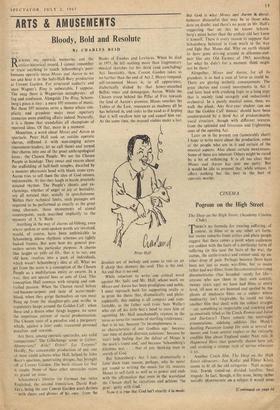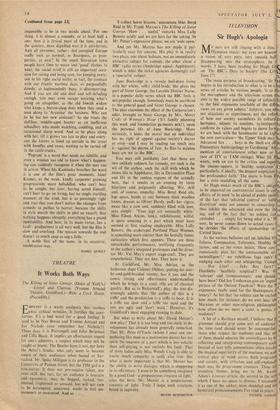CINEMA
Pogrom on the High Street
The Shop on the High Street. (Academy Cinema Club.) THERE'S no formula for treating suffering, of course, in films or in any other art form, but recent remarks from critics and plain people suggest that there comes a point when audiences are sodden with the facts of a particular form of suffering (in this case the facts of the war, the camps, the cattle-trucks) and cannot soak up an- other drop of pain. PerhapS because there have been not just so many war-films, but so many rather bad war-films; from the concentration-camp documentaries (that branded- -surely for life— anyone who saw them in their own context, twenty years ago) we have had films at every level, till now we are haunted and spoiled by the ghosts of mediocre films on a subject where mediocrity isn't forgivable. So could we take another film that dealt with the subject straight --say something as respectable and touching and , as emotively titled as the Czech Romeo and Juliet and Darkness? There remain the unstraight presentations, sidelong oddities like Munk's dazzling Passenger (camp life seen at several re- moves and from several angles) or the sinisterly credible film about England under Nazi rule, It Happened Here (not generally shown here yet, and arousing a strange rash of nerves wherever it is).
Another Czech film, The Shop on the High Street (directors: -Jan Kadar and Elmar Klos), seems to fit all the old categories: Nazi occupa- tion, Jewish round-up, divided loyalties, final tragedy. In fact, though, it fits none, being rather weirdly idiosyncratic on a subject it would seem [Continued on page 16
Continued from page 131 impossible to be in two minds about. For one thing, it is almost a comedy, or at least half a one; then it is lyrical most of the time, and in the quietest, most dignified way it is anti-heroic. Anti all extremes, rather: did occupied Europe really .look as normal, as bourgeois, as pros- perous, as neat? In the small Slovakian town people have time to waste and 'good' clothes to wear, the social stroll is still an important occa- sion for seeing and being seen, for keeping every- one in his right social niche; in fact, the contrast with our frantic wartime days, so purposefully dowdy, so highmindedly busy, is disconcerting. And if you are old and deaf and self-deluding enough, you may even escape noticing what's going on altogether, as the old Jewish widow who keeps a button-shop does when they send a man along to 'Aryanise' the business. Who can he be but her new assistant? So she treats the shiftless, middle-aged boozer as an inefficient schoolboy who needs watching, coddling, and an occasional sharp word. And so he plays along with her, till it grows too late to play and every- one she knows is lined up outside in the street with bundles and cases, waiting to be carted off in the cattle-trucks.
`Pogrom' is a word that needs no subtitle, and even a woman too old to know what's happen- ing can suddenly recognise it when she sees one in action. When Ida Kaminska breathes the word it is one of the film's great moments. Jozef Kroner, as the weak, kindly carpenter growing progressively more befuddled, who can't bear, to be caught, but later, having saved himself, can't bear to go on living, has no single startling moment of the kind, but is so piercingly right and true that you don't notice the changes from comedy to pathos to horror, because the shifts in style match the shifts in plot so exactly that nothing happens abruptly, everything has a grand inevitability. And here, in its main virtue, lies a fault: gradualness is all very well, but the film is slow and overlong. The tension towards the end doesn't so much snap as saga little.
ISABEL QUIGLY











































 Previous page
Previous page